6.9: The War of 1812
- Page ID
- 86135
The War of 1812
Soon after Jefferson retired from the presidency in 1808, Congress ended the Embargo, as the British relaxed their policies toward American ships. Although it was unpopular, Jefferson still believed that more time would have proven that peaceable coercion truly was an effective weapon of international diplomacy. Yet war with Britain loomed — a war that would galvanize the young American nation and convince many citizens that the many voices now inhabiting the national political arena all spoke with one voice.
The War of 1812 stemmed from the United States’ entanglement in two distinct sets of international issues. The first had to do with the nation’s desire to maintain its position as a neutral trading nation during the series of Anglo-French wars, which began in the aftermath of the French Revolution in 1793. The second had older roots in the colonial and Revolutionary era. In both cases, American interests and goals conflicted with those of the British Empire. And each time, British leaders showed little interest in accommodating the Americans.
Impressments, that is the practice of forcing American sailors to join the British Navy was among the most important sources of conflict between the two nations. Driven in part by trade with Europe, the American economy grew quickly during the first decade of the nineteenth century, creating a labor shortage in the American shipping industry. In response, pay rates for sailors increased and American captains recruited heavily from the ranks of British sailors. As a result, around 30 percent of sailors employed on American merchant ships were British. As a republic, the Americans advanced the notion that people could become citizens by renouncing their allegiance to their home nation.
To the British, a person born in the British Empire was a subject of that empire for life, a status they could not change. The British Navy was embroiled in a difficult war and was unwilling to lose any of its labor force. In order to regain lost crewmen, the British often boarded American ships to reclaim their sailors. Of course, many American sailors found themselves caught up in these sweeps and “impressed” into the service of the British Navy. Between 1803 and 1812, some 6,000 Americans suffered this fate. The British would release Americans who could prove their identity but this process could take years while the sailor endured harsh conditions and the dangers of the Royal Navy.
In 1806, responding to a French declaration of a complete naval blockade of Great Britain, the British demanded that neutral ships first carried their goods to Britain to pay a transit duty before they could proceed to France. Despite loopholes in these policies between 1807 and 1812, Britain, France, and their allies seized about 900 American ships, prompting a swift and angry American response. Jefferson’s Embargo sent the nation into a deep depression and drove exports down from $108 million in 1807 to $22 million in 1808, all while having little effect on Europeans. Within fifteen months Congress repealed the Embargo, replacing it with smaller restrictions on trade with Britain and France. Although, the Republican efforts to stand against Great Britain had failed, resentment of British trade policy remained widespread in American society.
Far from the Atlantic Ocean on the American frontier, Americans were also at odds with the British Empire. From their position in Canada, the British maintained relations with Native Americans in the Old Northwest, supplying them with goods and weapons in attempts to maintain ties in case of another war with the United States. The threat of a Native uprising increased after 1805 when Tenskwatawa began to preach a new religious doctrine that rejected the Europeans and their way of life. By 1809, Tecumseh, had turned the movement into a military and political alliance when he attempted to unite the tribes against the encroaching Americans. The territorial governor of Illinois, William Henry Harrison eventually convinced the Madison administration to allow for military action against the Native Americans in the Ohio Valley. The resulting Battle of Tippecanoe drove the followers of the Prophet from their gathering place, but did little to change the dynamics of the region. British efforts to arm and supply Native Americans, however, angered Americans and strengthened anti-British sentiments.
Republicans began to talk of war as a solution to these problems, arguing that it was necessary to complete the War for Independence by preventing British efforts to keep America subjugated at sea and on land. The war would also represent another battle against the Loyalists, some 38,000 of whom had populated Upper Canada after the Revolution and sought to establish a counter to the radical experiment of the United States.
In 1812, the Republicans held 75 percent of the seats in the House and 82 percent of the Senate, giving them a free hand to set national policy. Among them were the “War Hawks,” who one historian has described as “too young to remember the horrors of the last British war and thus willing to run the risks of another to vindicate the nation’s rights.” This group included men who would remain influential long after the War of 1812, such as Henry Clay of Kentucky and John C. Calhoun of South Carolina.
Convinced by the War Hawks in his party, Madison drafted a statement of the nation’s disputes with the British and asked Congress for a war declaration on June 1, 1812. The Republicans hoped that an invasion of Canada might remove the British from their backyard and force the Empire to change their naval policies. After much negotiation in Congress over the details of the bill, Madison signed a declaration of war on June 18, 1812. For the second time, the United States was at war with Great Britain.
While the War of 1812 contained two key players-the United States and Great Britain-it also drew in other groups, such as Tecumseh and the Indian Confederacy. The war can be organized into three stages or theaters. The first, the Atlantic Theater lasted until the spring of 1813. During this time, Great Britain was chiefly occupied in Europe against Napoleon, and the United States invaded Canada and sent their fledgling navy against British ships. During the second stage, from early 1813 to 1814, the U.S. launched their second offensive against Canada and the Great Lakes. In this period, the Americans, having gained some experience in 1812 and early 1813, won its first successes. The third stage, the Southern Theater, concluded with Andrew Jackson’s January 1815 victory at Chalmette outside of New Orleans, Louisiana.
During the war, the Americans were greatly interested in Canada and the Great Lakes borderlands. In July 1812, the U.S. launched their first offensive against Canada. By August, however, the British and their allies defeated the Americans in Canada, costing the U.S. control over Detroit and parts of the Michigan Territory. By the close of 1813, the Americans recaptured Detroit, shattered the Indian Confederacy, killed Tecumseh, and eliminated the British threat in that theater. Despite these accomplishments, the American land forces proved outmatched by their adversaries.
After the land campaign of 1812 failed to secure America’s war aims, Americans turned to the infant navy in 1813. Privateers and the U.S. Navy rallied behind the slogan “Free Trade and Sailors Rights!” Although the British possessed the most powerful navy in the world, surprisingly the young American navy extracted early victories with larger, more heavily armed ships. By 1814, however, the major naval battles had been fought with little effect on the war’s outcome.
With Britain’s main naval fleet fighting in the Napoleonic Wars, smaller ships and armaments stationed in North America were generally no match for their American counterparts. Early on, Americans humiliated the British in single ship battles. In retaliation, Captain Phillip Broke, of the HMS Shannon attacked the USS Chesapeake captained by James Lawrence on June 1, 1813. Within six minutes, the Chesapeake was destroyed (Figure 21) and Lawrence mortally wounded. Yet, the Americans did not give up as Lawrence commanded them “Tell the men to fire faster! Don’t give up the ship!” Lawrence died of his wounds three days later and although the Shannon defeated the Chesapeake, Lawrence’s words became a rallying cry for the Americans.

Two and a half months later the USS Constitution squared off with the HMS Guerriere. As the Guerriere tried to outmaneuver the Americans, the Constitution pulled along broadside and began hammering the British frigate. The Guerriere returned fire, but as one sailor observed the cannonballs simply bounced off the Constitution’s thick hull. “Huzza! Her sides are made of iron!” shouted the sailor and henceforth, the Constitution became known as “Old Ironsides.” In less than thirty-five minutes, the Guerriere was so badly destroyed it was set aflame rather than taken as a prize.
In 1814, Americans gained naval victories on Lake Champlain near Plattsburgh, preventing a British land invasion of the United States and on the Chesapeake at Fort McHenry in Baltimore. Fort McHenry repelled the nineteen-ship British fleet enduring twenty-seven hours of bombardment virtually unscathed. Watching from aboard a British ship, American poet Francis Scott Key (Figure 23) penned the verses of what would become the national anthem, “The Star Spangled Banner.” (Figure 22)
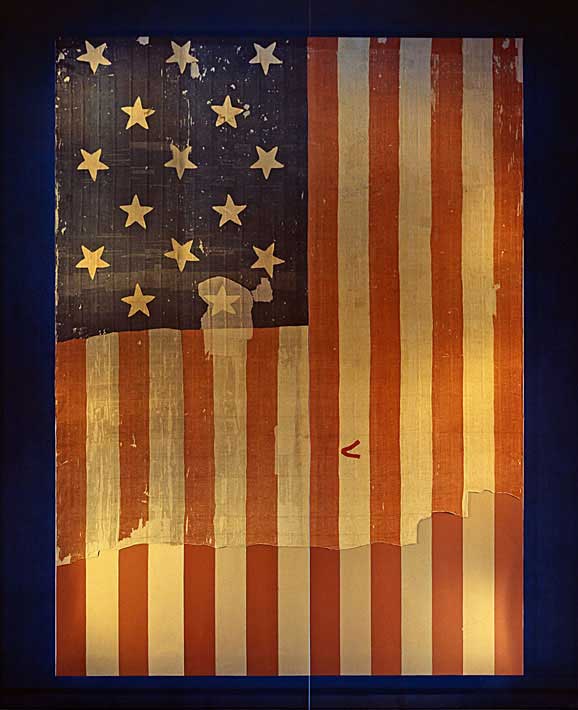
The large Star Spangled Banner Flag that inspired the lyrics of the US national anthem when it flew above Fort McHenry in the 1814 Battle of Baltimore. Shown here on display at the Smithsonian’s National Museum of History and Technology, around 1964. Many pieces were cut off the flag and given away as souvenirs early during its history. A linen backing, attached in 1914, shows the original extent of the flag.
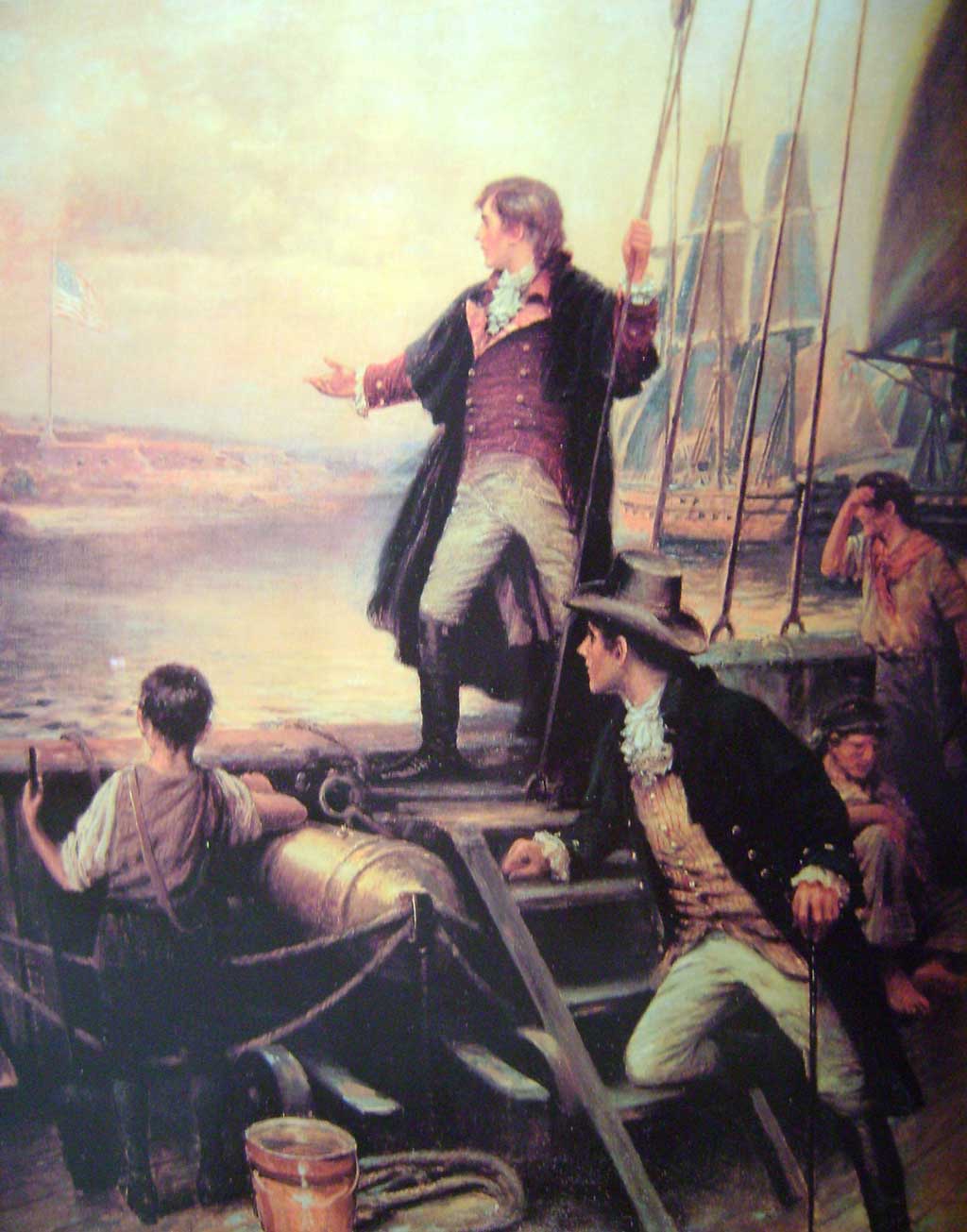
Francis Scott Key standing on boat, with right arm stretched out toward the United States flag flying over Fort McHenry, Baltimore, Maryland.
Impressive though these accomplishments were, they belied what was actually a poorly executed military campaign against the British. The U.S. Navy won their most significant victories in the Atlantic Ocean in 1813. Napoleon’s defeat in early 1814, however, allowed the British to focus on North America and their blockade of the East coast. Thanks to the blockade, the British were able to burn Washington D.C. on August 24, 1814 (Figure 24) and open a new theater of operations in the South. The British sailed for New Orleans where they achieved a naval victory at Lake Borgne before losing the land invasion to Major General Andrew Jackson’s troops in January 1815 (Figure 25). This American victory actually came after the United States and the United Kingdom signed the Treaty of Ghent on December 24, 1814, but the Battle of New Orleans proved to be a psychological victory that boosted American morale and affected how the war has been remembered.
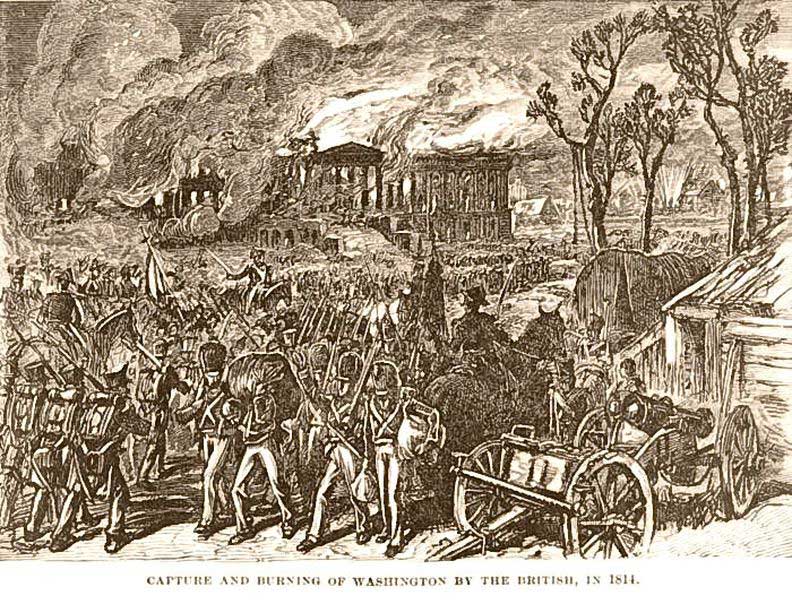
Drawing, “Capture and burning of Washington by the British, in 1814.” 1876 publication.
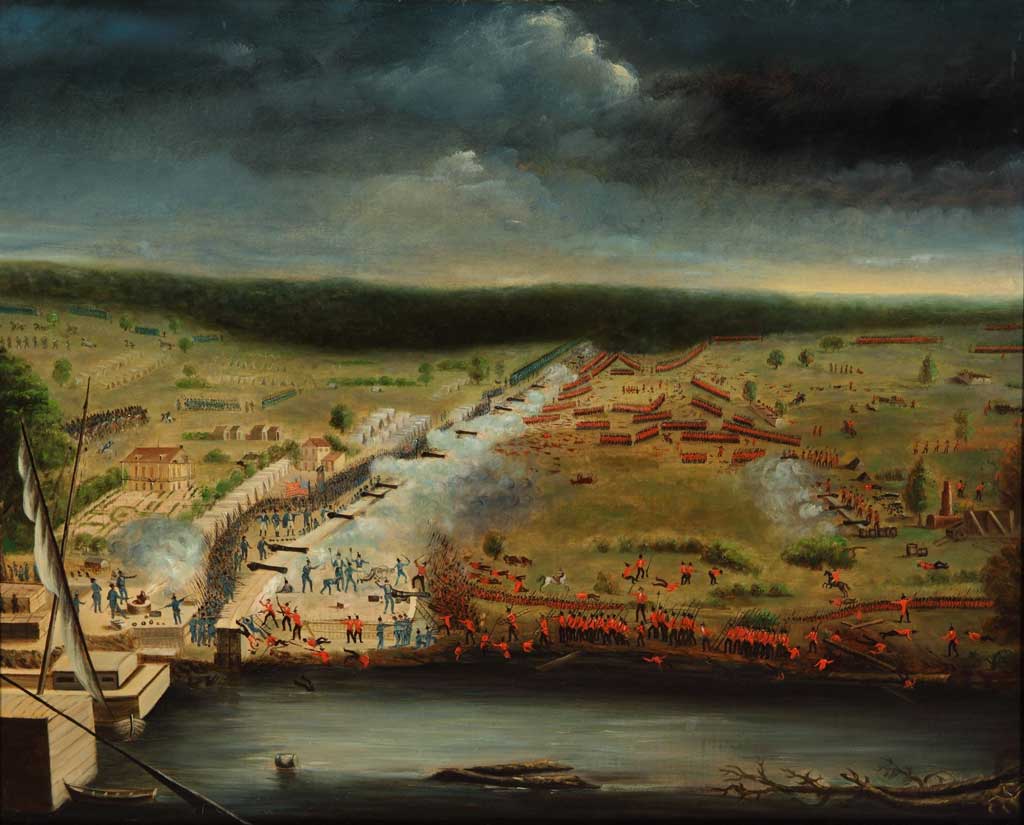
Painting by Jean Hyacinthe de Laclotte (1766 — 1829), a member of the Louisiana Militia who participated in the battle; painted by him after the victory based on his sketches made at the scene. — New Orleans Museum of Art
But not all Americans supported the war. In 1814, New England Federalists met in Hartford, Connecticut, to try to end the war and curb the power of the Republican Party. They produced a document that proposed abolishing the three-fifths rule that afforded Southern slaveholders disproportionate representation in Congress, limiting the president to a single term in office, and most importantly, demanding a two-thirds congressional majority, rather than a simple majority, for legislation that declared war, admitted new states into the Union, or regulated commerce. With the two-thirds majority, New England’s Federalist politicians believed they could limit the power of their political foes.
These proposals were sent to Washington, but unfortunately for the Federalists, the victory at New Orleans buoyed popular support for the Madison administration. With little evidence, newspapers accused the Hartford Convention’s delegates of plotting secession. The episode demonstrated the waning power of Federalism, and the need for the region’s politicians to shed their aristocratic and Anglophile image. The next New England politician to assume the presidency, John Quincy Adams in 1824, would emerge not from within the Federalist fold, but after serving as Secretary of State under President James Monroe, the last leader of the Virginia Republicans.
The Treaty of Ghent essentially returned relations between the U.S. and Britain to their pre-war status. The war, however, mattered politically and strengthened American nationalism. During the war, Americans read patriotic newspaper stories, sang patriotic songs, and bought consumer goods decorated with national emblems. They also heard stories about how the British and their Native allies threatened to bring violence into American homes. For examples, rumors spread that British officers promised rewards of “beauty and booty” for their soldiers when they attacked New Orleans. In the Great Lakes borderlands, wartime propaganda fueled Americans fear of Britain’s Native American allies, who they believed would slaughter men, women, and children indiscriminately. Terror and love worked together to make American citizens feel a stronger bond with their country. Because the war mostly cut off America’s trade with Europe, it also encouraged Americans to see themselves as different and separate; it fostered a sense that the country had been reborn.
Former treasury secretary Albert Gallatin claimed that the War of 1812 revived “national feelings” that had dwindled after the Revolution. “The people,” he wrote, were now “more American; they feel and act more like a nation.” Politicians proposed measures to reinforce the fragile Union through capitalism and built on these sentiments of nationalism. The United States continued to expand into Indian territories with westward settlement in far-flung new states like Tennessee, Ohio, Mississippi, and Illinois. Between 1810 and 1830, the country added more than 6,000 new post offices.
In 1817, South Carolina congressman John C. Calhoun called for building projects to “bind the republic together with a perfect system of roads and canals.” He joined with other politicians, such as Kentucky’s powerful Henry Clay, to promote what came to be called an “American System.” They aimed to make America economically independent and encouraged commerce between the states over trade with Europe and the West Indies. The American System would include a new Bank of the United States to provide capital; a high protective tariff, which would raise the prices of imported goods and help American-made products compete; and a network of “internal improvements,” roads and canals to let people take American goods to market.
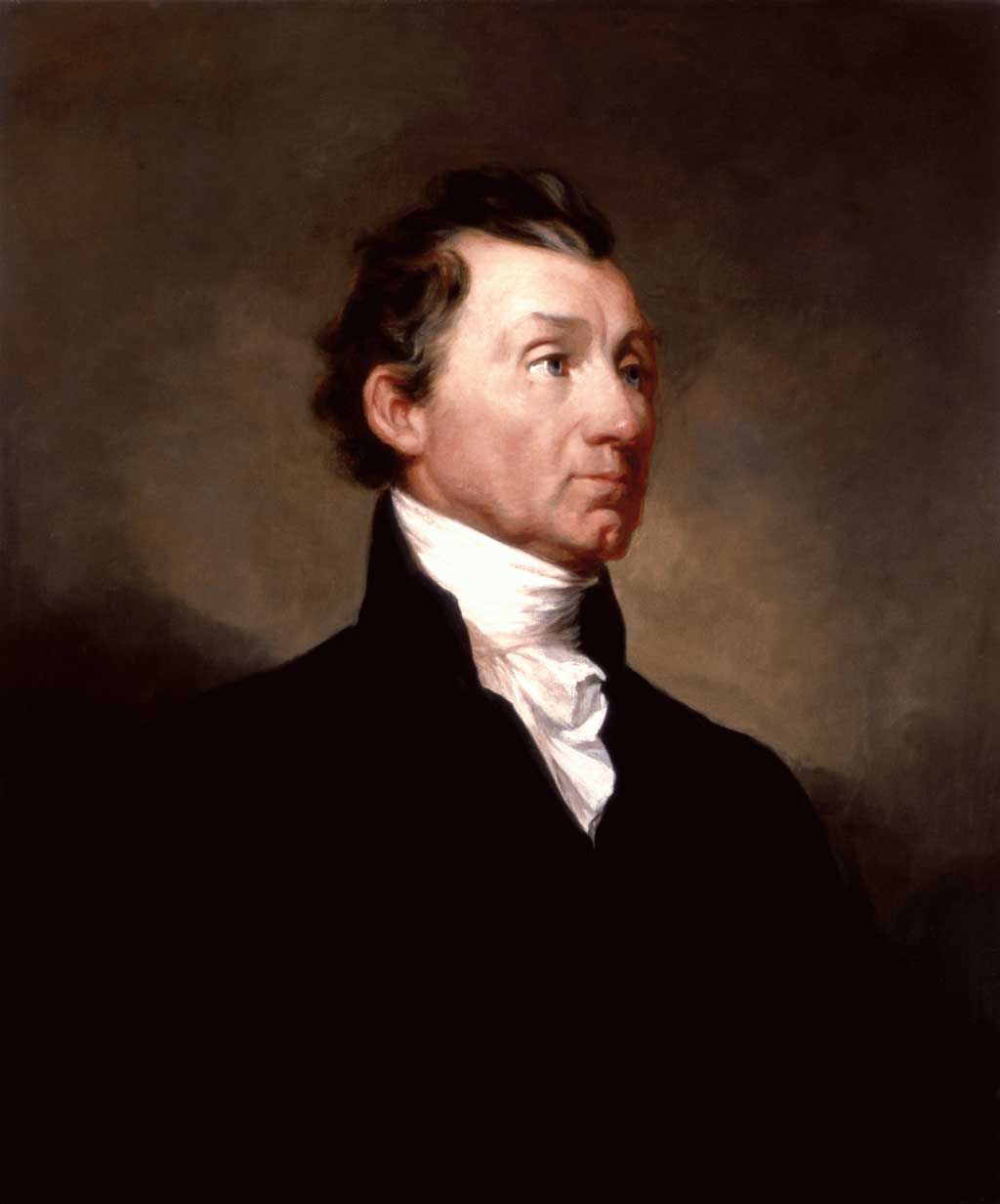
These projects were controversial. Many people believed they were unconstitutional or that they would increase the federal government’s power at the expense of the states. Even Calhoun later changed his mind and joined the opposition. The War of 1812, however, had reinforced Americans’ sense of the nation’s importance in their political and economic life. Even when the federal government did not act, states created banks, roads, and canals of their own.
What may have been the boldest declaration of America’s postwar pride came in 1823. President James Monroe (Figure 26) issued an ultimatum to the empires of Europe in order to support several wars of independence in Latin America. The “Monroe Doctrine” declared that the United States considered its entire hemisphere, both North and South America, off-limits to new European colonization. Although Monroe was a Jeffersonian, some of his principles echoed Federalist policies. Whereas Jefferson cut the size of the military and ended all internal taxes in his first term, Monroe advocated the need for a strong military and an aggressive foreign policy. Since Americans were spreading out over the continent, Monroe authorized the federal government to invest in canals and roads, which he said would “shorten distances, and, by making each part more accessible to and dependent on the other…shall bind the Union more closely together.” As Federalists had attempted two decades earlier, Republican leaders after the War of 1812 advocated strengthening the state in order to strengthen the nation. (3)
Sound-Scape
The Module 4 sound-scape features an 1809 letter from Thomas Jefferson to James Madison. As you’ll see in your reading for this module, American foreign policy at the time had to focus on preventing war between the U.S. and Britain and/or France. Jefferson’s letter addresses this issue. At the end of the letter, Jefferson writes about the U.S. creating an “empire for liberty,” which will become a very important concept for the rest of the century. 1
Listen to the letter from Thomas Jefferson to James Madison and follow along with the text.
Click on the speaker to listen.
An audio element has been excluded from this version of the text. You can listen to it online here: http://pb.libretexts.org/ush/?p=88
Letter from Thomas Jefferson to James Madison
Dear Sir
Yours of the 24th. came to hand last night. the correspondence between mr Smith & mr Erskine had been recieved three days before. I sincerely congratulate you on the change it has produced in our situation. it is the source of very general joy here, & could it have arrived one month sooner would have had important effects, not only on the elections of other states, but of this also, from which it would seem that wherever there was any considerable portion of federalism it has been so much reinforced by those of whose politics the price of wheat is the sole principle, that federalists will be returned from many districts of this state. the British ministry has been driven from it’s Algerine system, not by any remaining morality in the people but by their unsteadiness under severe trial. but whencesoever it comes, I rejoice in it as the triumph of our forbearing & yet persevering system. it will lighten your anxieties, take from cabal it’s most fertile ground of war, will give us peace during your time, & by the compleat extinguishment of our public debt open upon us the noblest application of revenue that has ever been exhibited by any nation. I am sorry they are sending a minister to attempt a treaty. they never made an equal commercial treaty with any nation, & we have no right to expect to be the first. it will place you between the injunctions of true patriotism & the clamors of a faction devoted to a foreign interest in preference to that of their own country. it will confirm the English too in their practice of whipping us into a treaty. they did it in Jay’s case; were near it in Monroe’s, & on failure of that, have applied the scourge with tenfold vigour, & now come on to try it’s effect. but it is the moment when we should prove our consistence, by recurring to the principles we dictated to Monroe, the departure from which occasioned our rejection of his treaty, and by protesting against Jay’s treaty being ever quoted, or looked at, or even mentioned. that form will for ever be a millstone round our necks unless we now rid ourselves of it once for all. the occasion is highly favorable, as we never can have them more in our power. As to Bonaparte, I should not doubt the revocation of his edicts, were he governed by reason. but his policy is so crooked that it eludes conjecture. I fear his first object now is to dry up the sources of British prosperity by excluding her manufactures from the continent. he may fear that opening the ports of Europe to our vessels will open them to an inundation of British wares. he ought to be satisfied with having forced her to revoke the orders on which he pretended to retaliate, & to be particularly satisfied with us by whose unyielding adherence to principle she has been forced into the revocation. he ought the more to conciliate our good will, as we can be such an obstacle to the new career opening on him in the Spanish colonies. that he would give us the Floridas to withold intercourse with the residue of those colonies cannot be doubted. but that is no price; because they are ours in the first moment of the first war, & until a war they are of no particular necessity to us. but, altho’ with difficulty, he will consent to our recieving Cuba into our union to prevent our aid to Mexico & the other provinces. that would be a price, & I would immediately erect a column on the Southernmost limit of Cuba & inscribe on it a Ne plus ultra as to us in that direction. we should then have only to include the North in our confederacy, which would be of course in the first war, and we should have such an empire for liberty as she has never surveyed since the creation: & I am persuaded no constitution was ever before so well calculated as ours for extensive empire & self government. as the Mentor went away before this change, & will leave France probably…
Thomas Jefferson to James Madison by Library of Congress is in the Public Domain
- Authored by: Florida State College at Jacksonville. License: CC BY: Attribution
- The American YAWP. Located at: http://www.americanyawp.com/. License: CC BY-SA: Attribution-ShareAlike

